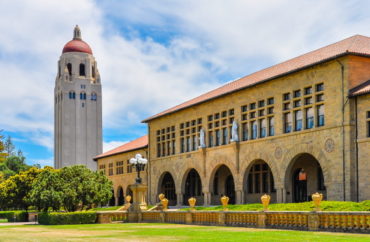
A new committee will consider ‘equitable proctoring practices’
Stanford University opened the door to allow faculty exam supervision by voting to change a 102-year-old policy that relied on students to police themselves.
Stanford President Marc Tessier Lavigne approved an Honor Code change proposal May 25, according to a Thursday post from Stanford Report, a university newsletter. University faculty and student government had passed the proposal the day before.
The passed proposal “establishes the Academic Integrity Working Group (AIWG), which will commission and implement a multi-year study about ‘equitable proctoring practices,’” The Stanford Daily reported Friday.
The faculty previously passed a resolution explicitly supporting exam proctoring.
Of the 720 Honor Code violations filed in the last three years at Stanford, just two were student-reported, according to an honor code committee recommendations document.
“It is widely recognized that the student reporting aspect of the Honor Code does not function as originally intended,” the proposal stated.
The old Honor Code held students responsible for avoiding academic dishonesty and holding their peers to account.
“The Honor Code is an undertaking of the students…that they will not give or receive aid in examinations; that they will not give or receive unpermitted aid in class work, in the preparation of reports, or in any other work that is to be used by the instructor as the basis of grading,” according to the Stanford Honor Code page as of May 26.
Students will also “do their share and take an active part in seeing to it that others as well as themselves uphold the spirit and letter of the Honor Code,” it stated.
“The faculty…manifests its confidence in the honor of its students by refraining from proctoring examinations and from taking unusual and unreasonable precautions to prevent the forms of dishonesty mentioned above,” it continued.
The College Fix reached out to Stanford University on May 15 and May 22 by email, and by phone on May 22, with questions regarding what prompted the proposed honor code changes, and what role technology plays in the need for proctors. Stanford replied on May 22 with a link the Stanford Report article. The university stated it has no further comment at this time.
‘The situation, both on and off campus, is dire, and with the advent of new technology can be expected to get worse,’ three Stanford professors wrote, referencing academic dishonesty
The proposal signed by the president on Thursday required approval by the Board of Judicial Affairs, the Undergraduate Senate, the Graduate Student Council, the Faculty Senate, and the university president, according to The Daily.
The Undergraduate Senate had voted to reject the proposal several times in April. It opposed changes to the honor code on the grounds that it would violate the precedent of trusting students. But the group finally agreed in May.
Three Stanford professors – mathematician Richard Taylor, political scientist Justin Grimmer, and engineering Professor Juan Santiago – introduced a motion April 27 in the Faculty Senate that departed from the students’ decision and voted to approve proctoring, according to a May 22 article in The Stanford Daily.
“Taylor referenced senior exit surveys by The Harvard Crimson and The Daily Princetonian, which found that 20% to 30% of anonymous respondents admitted to some form of cheating on an assignment or exam,” The Daily reported.
“The situation, both on and off campus, is dire, and with the advent of new technology can be expected to get worse,” the three professors wrote in an April 30 letter to the editors of the student paper.
The motion passed the Faculty Senate with a 21-22 vote..
In passing the motion, the faculty was “ignoring students” and “completely dismissing the shared governance model,” student government representative Gurmenjit Bahia told The Daily.
“The University prides itself in a shared governance model and has continued to ensure that students are included in decision making,” she said. “Such a change would completely obliterate the trust between faculty and us.”
The Fix reached out to both the faculty and undergraduate Senates on May 18 and May 24 with questions regarding the senates’ positions on proposed changes to the honor code, and possible pros and cons of allowing proctors. Neither has responded.
MORE: Please proctor our exams to prevent shameless cheating: student op-ed
IMAGE: Stanford University




Please join the conversation about our stories on Facebook, Twitter, Instagram, Reddit, MeWe, Rumble, Gab, Minds and Gettr.